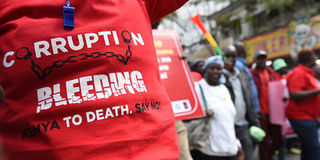We should restore trust in public institutions to get development

An anti-corruption protest in Nairobi on May 31, 2018. Life is still about struggle and survival. Corruption is systemic. PHOTO | FILE | NATION MEDIA GROUP
What you need to know:
- Institutions must have clear mandate and area of remit and talented qualified personnel, not political sycophants.
- It is business as usual in our courts, where slow-moving corruption cases are enriching lawyers and may end in no convictions.
Economists and organisations such as the World Bank and International Monetary Fund say effective public institutions are a major driver of sustainable development.
It is one of the major distinctions in our ordered world: Advanced economies have highly trusted public institutions. Good leaders prioritise institutional building.
Autonomous institutions bring an issue-focused approach to development. They build domestic capacities, foster posterity and engender sustainability into governance — taking it beyond individual regimes or administrations.
It is these, not leaders, that actually transform nations and bolster the well-being of the people.
It makes sense, therefore, that the United Nations unanimously agreed in 2015 on the need to build effective, accountable and inclusive institutions as the 16th Sustainable Development Goal.
Institutions must have clear mandate and area of remit and talented qualified personnel, not political sycophants.
POLITICIANS
Development levers, such as transparency and accountability, need financially prudent management capable of giving taxpayers institutional value addition accompanied by uncompromised, rigorous, comprehensive independent audits.
Setting up a public institution is only half the battle. It is equally important to get the buy-in of stakeholders, including the public.
This can only be accomplished by sustained campaigns to nurture public trust and confidence in such organisations.
Since the Moi days, some politicians have consistently undermined public trust in national institutions.
While calls for outright civil disobedience have often failed, they have somewhat achieved their objective through other means.
Until the “handshake”, Raila Odinga was very predictable.
With consistent regularity, he accused governmental bodies, including the Judiciary, of being corrupt and compromised.
CORRUPTION
His never-ending squabbles with successive electoral bodies have eroded public trust in elections in general and the Wafula Chebukati-led IEBC in particular.
Some Raila supporters still hang on his words that many of our MPs and Senators are “vifaranga vya kompyuta” — a cheap shot that they were not validly elected.
Raila is on record accusing the National Treasury, under then-Cabinet secretary Henry Rotich, of executing a large fraudulent Eurobond sale whose proceeds went into private accounts overseas.
This could be the reason why most Kenyans were gleeful and showed Rotich no love when he was hounded out.
Also, some leaders turn their organisations into outfits of personal enrichment. Leadership wrangles threaten to paralyse activities at the NCCK, some SDA conferences, the CA and Knut.
POOR GROWTH
Regional development authorities are corrupt to the core — as evidenced by the Lake Basin and Kerio Valley development authorities.
Some people, like long-time Cotu Secretary-General Francis Atwoli, do succession politics more than they champion worker’s rights.
Handshake believers claim the country is now peaceful — as though we were in an all-out war with one another!
For most Kenyans, however, life is still about struggle and survival. Corruption is systemic.
Multinationals are leaving due to high cost of doing business. Known thieves are enjoying their illicit wealth in full view.
The DCI and DPP are doing a lot of barking on social media. It is business as usual in our courts, where slow-moving corruption cases are enriching lawyers and may end in no convictions. And then there are those untouchable ‘sacred cows’.
ACCOUNTABILITY
Granted, many of our institutions perform dismally and therein lies a chance for the President and Mr Odinga.
Leveraging their truce, the two could address public mistrust by making public institutions representative, transparent, apolitical and effective.
Honest criticism should replace blanket condemnation, derision and propaganda. In hindsight, perhaps Chebukati and his IEBC did their best.
What if there was no Eurobond heist and Rotich acted in good faith? Maybe the DCI and DPP are not selective. What if they are?
Mr Chesoli is a New York-based development economist and global policy expert. [email protected] @kenchesoli





